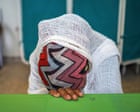
As the world navigates through complex international and domestic challenges, recent developments highlight significant issues across various regions. This article presents an overview of the current global landscape, focusing on recent events with profound societal impacts.
In Ethiopia’s Tigray region, a comprehensive report details grave allegations of crimes against humanity, spotlighting systematic sexual violence. Researchers from Physicians for Human Rights and the Organization for Justice and Accountability in the Horn of Africa (OJAH) have documented over 500 cases involving mass rape, forced pregnancy, sexual slavery, and torture of women and children. These acts, reportedly executed by Ethiopian and Eritrean forces, emphasize a dire need for accountability and protection of human rights in conflict-affected areas.
Across the Atlantic, geopolitical tensions are rising as the United States imposes economic measures on Brazil. The administration has levied a 50% tariff on Brazilian imports, raising concerns about the impact of these policies on democratic institutions. Concurrently, sanctions on a Brazilian Supreme Court judge underline the complexities of international alliances and underscore broader questions about political influence and sovereignty.
Amidst rising digital privacy concerns in China, reports of online platforms sharing explicit images without consent have sparked widespread public outrage. With over 100,000 members reportedly participating, these online forums highlight critical challenges regarding digital ethics and privacy. The revelations have prompted a significant outcry on social media, emphasizing the urgent need for regulatory measures to protect individuals from such violations of privacy.
Meanwhile, tensions continue to simmer in the Middle East, where Australian activists participating in a Gaza aid mission have accused Israeli forces of psychological mistreatment. The activists claim they were denied communication and access to medication during their detention, raising questions about the treatment of humanitarian workers. This incident coincides with renewed calls for peaceful demonstrations, as several New South Wales politicians advocate for a pro-Palestine march across Sydney Harbour Bridge, seeking to highlight the ongoing humanitarian concerns in Gaza.
Additionally, the release of an Israeli settler accused of killing a Palestinian activist has accentuated longstanding issues in the Israeli-Palestinian conflict. The settler’s release while the activist’s body remains withheld has sparked dialogue on justice and human rights, further deepening regional tensions.
In Africa, residents around Lake Chad are grappling with the dual threats of climate change and militant activity from Boko Haram. Contrary to previous assumptions, the lake is expanding, adversely impacting local agriculture and livelihoods. Communities are organizing to better manage the challenges posed by environmental changes while navigating the security concerns posed by extremist groups.
Lastly, the Palestinian Islamic Jihad’s public release of a video featuring an Israeli hostage marks a somber note. The hostage, held since April, represents a poignant reminder of the ongoing volatility and humanitarian challenges in the region.
As these stories unfold, they reflect the multifaceted challenges faced by communities worldwide. These issues require thoughtful engagement and collaborative solutions to promote peace, security, and human dignity across various regions.
Source: {link}
